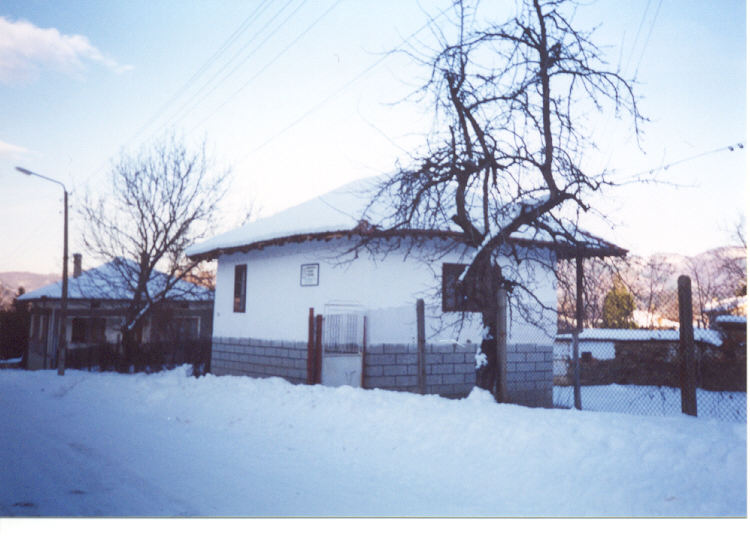Pravetz Church of God
The Lord called me for the ministry in the end of September 1990 in a small house at the outskirts of a mountain town in Bulgaria by the name of Pravetz. In 1990 I was only 16 years old. At the time, Pravetz was known as a stronghold of communism where the communist president who ruled Bulgaria for 36 years was born. Yet, a small group of Pentecostal believers had kept the faith during the long years of persecution during the Communist Regime. It was there that the Lord called me for ministry, as He later called many others that are today spread around the world.
I began working with a small group of students from the local Computer Technical School. Our number was twelve to be exact. The work was not without the help of more experienced Christians and the pastor of the local Church of God. Coming out of the persecutions, the church had no building, and we met at private homes. We studied the Bible and practiced what we learned from its words. All night prayer meetings were a weekly event, and the chain fasting almost never stopped. No one of us knew or had ever experienced a genuine spiritual revival, yet deep inside ourselves we all wanted to be closer to God.
In the spring in 1991 it all came together. The church was able to rent a small building formerly used for a Communist club. A number of young people from the local schools began attending the services. Many of them were my schoolmates, as I myself was a student at the Computer Technical School in Pravetz. Soon enough we had to start a separate service for teenagers, which was held on Tuesday evening. On some of the services we witnessed up to fifteen people getting saved and baptized with the Holy Spirit. Our number grew rapidly and we had to move our meetings to the larger facility of the Pravetz Youth Center. More and more students were interested in what God was doing. The lives of many who were well known drug addicts and alcoholics were dramatically changed forever as they were delivered from sin and saved.
In the fall of 1991 I returned from my summer break with a fresh strategy. I started a verse-by-verse study on the book of Revelation. I was only seventeen and I had only preached for a year. I was using an old Bulgarian translation of Larkin’s 1919 book on Revelation. At this time our youth group was over 100 and growing. The study continued nine months challenging our desire for deeper knowledge and spiritual growth.
We gathered for prayer every morning before school. Since the dorms did not open until 6:30 a.m., we often had to jump through the windows of the first floor to go to the church for prayer. At that time the church had rented another building known as the Officers Cafeteria for its meeting. In the cold winter mornings we went to the church for prayer sometimes having to walk through the fresh snow that had covered the streets of the small mountain town during the night. In the spring we went up on a small hill outside of the town called Monovetz. It was during this time that one of the school officials spread derogatory remarks about our prayer meetings. Many of us were called into the offices and interrogated for our beliefs. Yet, nothing was able to stop the revival. The youth group was growing rapidly. On some meetings we counted up to 175 people. The year was 1991.
More than ten years later, I am again reporting this story not to brag about its success, but to express my desire for revival. The old times are now gone. Many of the members of the Pravetz Church of God youth group now live around the world. Beside Bulgaria, there are many in the United States, Canada, Austria, United Kingdom, Australia, Spain, Israel, South Africa, etc. Yet, in my thoughts I often return to the small mountain Bulgarian town. I climb the quite hill before dawn breaks and I pray a silent prayer. I pray to God to see and bless every one who participated in the Pravetz Revival wherever in the world they may be. I pray that He somehow gathers us once again in this lifetime, and reconciling every one and each of us with Himself to let us find ourselves again in His presence of love and anointing. I pray that He somehow reaches us wherever we may be and revive us again. I pray for a new revival because revival must go on …
Bulgarian Evangelical Church of God in Chicago
This is the story of the first Bulgarian Church of God established in the Untied States. The church was started in the building of the Narragansett Church of God in Chicago which at the time was pastored by Rev. Sean O’Neal. Led by a dynamic cross-cultural vision, the congregation expanded in several ethnic branches. Using a strategy home mission’s approach the church soon became an important religious center for the Chicago metro.
In December 1994, the Lord led me to participate in a step-mission trip to Chicago organized by the students of East Coast Bible College. As preparations were made we learned of several Bulgarians who attend the Narragansett Church of God in Chicago. Unfortunately, they had been hurt by some Bulgarian ministers who had visited them before and were very suspicious of any organized church work. Yet, I was introduced to them and was able to minister to them in several services.
By the end of our mission trip Pastor O’Neal invited me to join him in his attempt to begin a Bulgarian church in the city. Although at this time Chicago was a center for more than 12,000 Bulgarian immigrants no one had attempted to start a Bulgarian Protestant church.
After much prayer I arrived in Chicago on May 27, 1995. In the remaining part of May we created a strategy to reach as many Bulgarians as possible. This included visitation of families, attending Bulgarians social functions, and establishing contact with several Bulgarian organizations active in the Chicago area such as the Bulgarian Club and the Orthodox Church. In June we executed this plan with much success. During this time I lived with a Bulgarian family and slept on the balcony of their apartment on Jackson Boulevard. Often, I had to spend the night in the church building as well. But the most important thing was to carry the vision to the end.
On July 9, 1995 the first organized Bulgarian Church of God was established in Chicago city. I was privileged to preach on the subject of forgiveness as 10 Bulgarians attended. Little I knew that in the years to come much forgiveness will be needed as the church will be torn apart by deep bitterness, personal ambitions, frequent confusion and lack of mission. Yet, while the works of men fails, the work of God remains.
By the end of the summer of 1995 the Bulgarian Church in Chicago had grown to 42 people. Thanks to the faithful and united work of Bulgarians and Americans in the fall of the same year the number was 64. On October 7, 1995, I was able to visit the church in Chicago again and present it to the National Overseer of the Bulgarian Church of God, Pastor Pavel Ignatov who visited the church for the first time. The church became not only the first officially registered Bulgarian Pentecostal congregation in the United States, but also an important social and educational center able to minister to the 100,000 Bulgarians that live in the Great Lake region today.
Called to another mission, I left Chicago on July 30, 1995. The church bulletin upon my departure under Farewell and Appreciation read: “Today we are saying thank you to Dony for a job well done this past summer. He has served our church faithfully, and has been a tremendous blessing to Narragansett Ministries. Immediately following worship this morning, there is a dinner in Dony’s honor in the fellowship hall. And everyone is invited to attend.”
The church congregation presented me with a plaque that represented my efforts and work in Chicago. But for me, this plaque represents much more. It represents the prayers and the vision of many who are continuing the work today, establishing and leading Bulgarian churches around the world to providing pastoral care for many who have left the homeland in search for a better life. To these ministers goes my personal token of appreciation and thanks, “Well done thou good and faithful … “
Window for the Price of a Church
January 20, 2007 by Cup&Cross
Filed under 365, Publication
As a Pentecostal Christian, I love the church. I love going to church, participating in church and simply being the church. It is my only true passion. I love making the church a better place. If there was a phrase “born to church,” it would define me completely. In the words of an unknown preacher, “I’m as churchy as Noah was arky.”
I love to worship with psalms, hymns, spiritual songs with all people regardless of age or ethnicity. I love singing from the old red-back hymnal, just as much as singing contemporary songs. Southern gospel pleases me, but Christian hard rock, techno or gospel rap does not scare me one bit. I cannot help but often wonder if one day Christian rock lyrics will be on the pages of the red-back hymnals.
I also love listening to the message, whether it is delivered inside or outside of the church walls. A good sermon always inspires me. Some sermons touch my soul while others simply entertain me. And I do have to admit, that some preachers bore me. I wish that I could tell them to keep their day job, for after all if you are going to be doing the work of the Lord, please do it right.
And then, there is the prayer at the alters, which I also love. I know this may sound very Pentecostal, but in our postmodern context of worship there is really no other time during service where people finally hush and allow God to speak.
But something has been bothering me lately. Every time I sing, listen to the sermon or pray at the church altar, I have to face a wall with a huge stained glass window. I know it cost as much as a brand new AMG Mercedes Benz and this disturbs me a bit. My concern arises because I am personally familiar with locations where a brand new church could be built for this same amount of money. I guess I have chosen a different value system and I cannot help but ponder, “How many souls will come to Christ because they saw the light reflected through this magnificent stained glass window?”
I know that some will say, “Well, if you don’t like the window, just turn the other way.” And I mustask, “What would happen if every time we see something wrong with our church we turn the other way?”
So next time, when you worship, listen to your pastor or pray facing that stained glass window, which costs as much as a church, please ask yourself the question, “Should a window cost as much as a church?” Just something to think about …
Services at the Central Church of God in Sofia
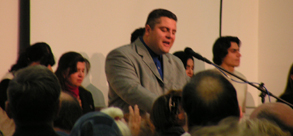 We returned from yet another exciting trip to Sofia where we ministered at the Central Church of God with pastor Pavel Ignatov. After a six year building program, the church is now equipped with a new multifunctional center. Although this is not our first service there, we were amazed again how the new building enhances the ministry of the church through its multiple ministry applications.
We returned from yet another exciting trip to Sofia where we ministered at the Central Church of God with pastor Pavel Ignatov. After a six year building program, the church is now equipped with a new multifunctional center. Although this is not our first service there, we were amazed again how the new building enhances the ministry of the church through its multiple ministry applications.
To begin with, the location of the new worship center is close to downtown Sofia. This is important because as the capital of Bulgaria, the city has experienced an escalated growth in the past ten years reaching a population of over two million. The Central Church of God is conveniently located at the very heart of the metropolis as at the same time it is close to the main roads, which can easily lead to the city loop and out of the city.
The convenient setting provides for a multitude of ministries. For example, the social center in the new building daily provides lunch for a large number of elderly people whose pensions of a limited amount are not sufficient for all expenses of a life in the big city. The food is delivered to them fresh at the same time every day and is free of charge.
The church’s center is also used for a number of conferences and church leadership meetings. Just in the past several weeks along with the regular services, they have completed a revival, Christian Advocates conference, youth rally, ministerial training course, national advisory meetings and a great number of weddings (normal for this time of the year in Bulgaria). The congregation is currently planning a nationwide evangelization meeting for the beginning of November.
The service we held at the Central Church of God was encouraging for us. At first, the large auditorium with over 1,000 seats looked a bit empty due to Sofia’s main streets being blocked for a city marathon. Yet, soon after the worship team began, the auditorium filled up as people continued to arrive until the end of the sermon. At the end of the service, we asked the congregation to join us at the altar and pray with us a special prayer for the unity of Bulgarian Pentecostals. The final benediction urged the church that revival must go on, but this would only happened if the people of God stand as one.
Services at Samokov Church of God
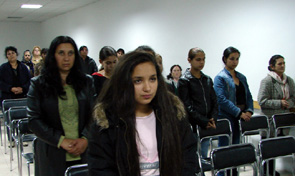 We just returned from Samokov, which is one of the oldest industrial towns in Sofia. Almost 200 years ago the first protestant missionaries to Bulgaria discovered its strategic location and used it as a halfway point between Europe and Asia in their mission trips. Soon a modern American school opened its’ doors and some of the brightest minds of the Bulgarian Renaissance were educated there. We visited with one of the Roma (Gipsy) churches in town and held a Sunday service plus two youth rallies. These services were part of our national ministry and support to the Roma people of Bulgaria.
We just returned from Samokov, which is one of the oldest industrial towns in Sofia. Almost 200 years ago the first protestant missionaries to Bulgaria discovered its strategic location and used it as a halfway point between Europe and Asia in their mission trips. Soon a modern American school opened its’ doors and some of the brightest minds of the Bulgarian Renaissance were educated there. We visited with one of the Roma (Gipsy) churches in town and held a Sunday service plus two youth rallies. These services were part of our national ministry and support to the Roma people of Bulgaria.
Return to Yablanitza Church of God
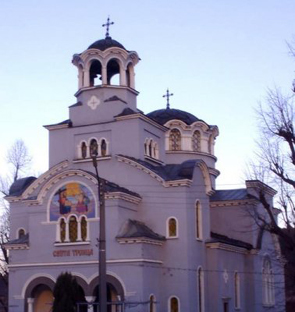 Because of its strategic importance in our ministry, the return to Yablanitza has been a long planned event. During a successful pastoral term in 1992-1993, we were able to encourage the church to continue and complete its prolonged building program. Several of our closest friends were also instrumental in preparing the blueprints and sponsoring the building project. As a result a modern ministry complex is now active in the town of Yablanitza as a part of the Bulgarian Church of God ministry there.
Because of its strategic importance in our ministry, the return to Yablanitza has been a long planned event. During a successful pastoral term in 1992-1993, we were able to encourage the church to continue and complete its prolonged building program. Several of our closest friends were also instrumental in preparing the blueprints and sponsoring the building project. As a result a modern ministry complex is now active in the town of Yablanitza as a part of the Bulgarian Church of God ministry there.
We returned to Yablanitza for a series of revival services and were able to minister to a good number of people while there. The revisiting with old friends and precious memories were both refreshing and motivating. We are praying to be able to conduct another revival series in the area and to minister in the Yablanitza church in the near future.
New Church in the Spirit
The struggles surrounding the Bulgarian Confessions Act are not over. The search for a democratic paradigm which integrates religious freedom and freedom of conscience is not completed. As religious pluralism in Bulgaria occurs, unfortunately, in the forming postmodern context, the time has come for the Bulgarian Church to rediscover its historic identity by revisiting its Biblical theology. Common theological presuppositions presented within the faith of all Bulgarian Christians must lobby religious tolerance and create a healthy environment for the implementation of a new paradigm for ministry which will successfully incorporate interdenominational partnership.
The first step toward such a paradigm may have been made as Orthodox, Catholic and Protestant believers came together on October 23, 2004. In an “Universal Character of the Christian Church” round table discussion, they considered the possibility of the establishment of a religious community where Christians from various denominations can come together to worship in freedom from fear and according to their religious convictions.
As a direct result of the round table, on February 19, 2005 the participants came together again to establish a new church based on unity and tolerance. It was named, Christian Catholic (with the meaning of Universal) and Apostolic Church. Orthodox priests and protestant pastors came together to set forth into ministry the pastor of the new church the Pentecostal minister and scholar, Vili Altanov. The service was moderated by bishop Alexy Dardakius from the Russian Orthodox Reformed Church.
The participation of protestant and orthodox ministers in one church by itself is a global precedent. In Bulgaria it is an indication of religious freedom and tolerance. The new paradigm incorporates the protestant style of preaching along with eastern experiential theology. The church claims this is not simply a new form of institutional ecumenism, but a new paradigm for ministry in unity created by the Spirit.
The idea for the new formation comes from father Christo Pissarov, who was involved in the struggles for new social space within the Bulgarian Orthodox Church in 2004. According to him, this new paradigm of ministry does not purpose reform of any of the existing in denomination. On the contrary, it is an attempt of coming together in the Spirit and ministering in the presence of God in unity.
The Bulgarian Underground Church
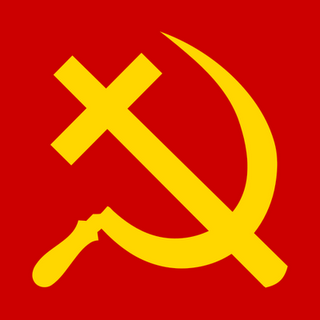 The modern day Pentecost began in Bulgaria in the 1920s as Ukrainian immigrants Zaplishny and Voronaev preached in the Congregational church of Bourgas where several were baptized with the Holy Spirit. In the late 1920s a conservative Pentecostal group emerged and formed the union called the Church of God. After the 1944 Communist Revolution in Bulgaria it continued its existence as an underground organization and was severely persecuted. In 1986, the Bulgarian Church of God joined the Church of God (Cleveland, TN). A national revival followed the fall of the Berlin Wall in which hundreds of thousands of people have been touched by the power of God. Today, the Bulgarian Pentecostal Movement claims over 100,000 members.
The modern day Pentecost began in Bulgaria in the 1920s as Ukrainian immigrants Zaplishny and Voronaev preached in the Congregational church of Bourgas where several were baptized with the Holy Spirit. In the late 1920s a conservative Pentecostal group emerged and formed the union called the Church of God. After the 1944 Communist Revolution in Bulgaria it continued its existence as an underground organization and was severely persecuted. In 1986, the Bulgarian Church of God joined the Church of God (Cleveland, TN). A national revival followed the fall of the Berlin Wall in which hundreds of thousands of people have been touched by the power of God. Today, the Bulgarian Pentecostal Movement claims over 100,000 members.
However, this was hardly the case through the years of persecution when the Bulgarian Church of God refused to register with the Communist state and remained underground for over 45 years. Recently published archives from that era show that the Bulgarian underground church grew slowly during the Communist regime experiencing virtually constant crises in leadership and structure. At the same time the government aggressively attempted to penetrate and influence the organization of the church in order to revert its growth.
One of the earliest archive documents from that era is a 1974 study which reported that the Bulgarian Church of God had 600 members nationwide. By 1981, the membership had grown to over 2,000 members with congregations in 25 cities. The congregation in the capital Sofia had 100-150 members, but grew to over 200 by the end of 1982. At the same time, the Bulgarian Pentecostal Union (registered with the government and affiliated with the Assemblies of God) had approximately 10,000 members.
A detailed list of churches and members was kept in government archives as the secret service was ordered to watch the underground church closely. The agent’s logs from that time show approximately 1,000 known members. This number is only a fraction of the actual membership, which at large remained underground and hidden from the eyes of the agents.
The pressure from the secret service was not able to stop the growth of the underground church. By 1985, the Bulgarian Church of God had grown to 3,000 members nationwide while doubling the number of congregations to over 50. Two years later this number was 4,000 and continued to grow as the central church in the capital Sofia had 600 members and several churches (like the ones in Rouse and Gabrovo) had congregations over 200. In 1989, the Communist regime collapsed and Bulgaria began its journey on the road of democracy. In 1990, the Bulgarian Church of God received government recognition as an official denomination representing over 5,000 nationwide to become the fastest growing Bulgarian church with over 30,000 members today.
Bulgarian Church of God
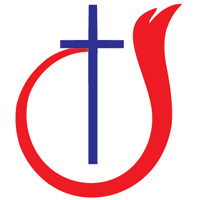 Since the Fall of the Berlin Wall in 1989 the Pentecostal churches in Bulgaria have been instrumental in the proceeds of reaching the minorities in Bulgaria. Over 10,000 Muslims have accepted Christ. The rapid growth of the Bulgarian Church of God has influenced large portion of the ethnic minorities in the country. As a result large minority congregations have emerged (for example Samokov with membership of 1,700, and Razlog of 450). In 2002 the ratio of ethnic groups within the Bulgarian Church of God was:
Since the Fall of the Berlin Wall in 1989 the Pentecostal churches in Bulgaria have been instrumental in the proceeds of reaching the minorities in Bulgaria. Over 10,000 Muslims have accepted Christ. The rapid growth of the Bulgarian Church of God has influenced large portion of the ethnic minorities in the country. As a result large minority congregations have emerged (for example Samokov with membership of 1,700, and Razlog of 450). In 2002 the ratio of ethnic groups within the Bulgarian Church of God was:
Bulgarians: 66% Gypsies: 20.3%
Turkish: 6.5 % Russian: 3.7 %
Armenians: 2.5 % Others: 1%
The Bulgarian Church of God strives to supply not only for the spiritual needs in the minority communities where they minister, but also respond to the drastic need for food and heat. The Bulgarian Church of God has planned in the year 2002 to increase our Gipsy membership by 80% and thus to develop Pentecostal influence over more than 75% of the Gipsy community in Bulgaria.
The Church in Central Europe: Not Prepared for Freedom
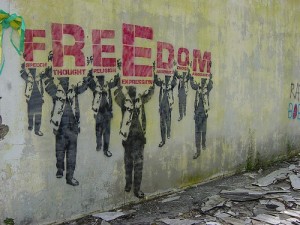 David Machajdik and Juraj Kusnierik
David Machajdik and Juraj Kusnierik
The mid-1980s saw some Christians in some local churches starting to speak about and “do” evangelism. The climate in society was changing. It became possible to share one’s faith in a secular environment. People from a completely atheistic background became Christian. It was not a mass movement, nor was it a “national revival.” The only possible (and still today probably the best) method of evangelism was sharing one’s life—including one’s relationship with God—with friends and relatives. All this was done informally, sometimes secretly. The word “ministry” with its spiritual connotations was as yet unknown.
Then came the revolutionary changes in 1989. Christians “went public.” The first (and at the same time the last) big evangelistic events took place. Famous evangelists visited Eastern and Central European capitals. Mission organizations supported by local churches started to do “street evangelism.” Religion was given air time on radio and television. Foreign missionaries arrived. It was only natural to expect a great growth in the church. However, this growth has not taken place. People see the church as important and as a useful component of society, but they themselves do not want to be under its influence. After the initial enthusiasm was over, the church somehow “faded out.” It is still there; it is surviving, but not growing very much.* The reasons are many. We are able to perceive and comment on only some of them.
The Church was surprised by the complexity of the free world. After 1989 Christian leaders did not have much to say about issues discussed in society such as nationalism, business ethics, or the role of the state. Even topics frequently discussed by Christians in the West (such as abortion, ethics, social involvement, or education) were new to the church in post-Communist countries. During the first years after the change of regime, leading personalities in the church did not see these issues as important. They thought that preaching the message of personal salvation did not need to take a new context into consideration. The Gospel was thus unintentionally reduced to a set of slogans without any connection with the complex reality of life. Methods learned from nineteenth century revivals did not always work in a post-Communist society.
Gaps in theology were patched up by fervent activism. Only a handful of English or German speaking pastors had limited access to theological literature and even that was more on a popular level. Classical works of systematic and historical theology were not available. There were big and significant gaps in theology as a result of forty years of atheistic socialism. Problems arose when a lack of theological insight was perceived as a virtue. Weakness was called strength. Theology was seen as a useless intellectualism, leading one to confusion. Many activities were going on, but superficiality was often their common denominator. Religious programs on television are easily recognizable by their naiveté, simplicity, superficiality, and cultural weirdness. They are also very boring. They do not usually have much to say to the ordinary skeptical Central European even if he or she is searching for truth and the meaning of life.
The Church in post-Communist countries has been burdened by its unresolved past. The great majority of Christians living under Communism were apolitical. That meant that they did not openly criticize the totalitarian regime in which they lived. They very rarely supported or had any relationships with dissidents. Some church leaders tried, with varying degrees of success, to win more freedom for their churches by a “controlled collaboration” with the Communist regime. An example of this was that some signed statements rejecting the demands voiced by any given dissident movement, even if they were usually convinced that the truth was on the side of the dissidents, in order to gain greater freedom for various ministries in their churches. It is difficult now to judge these acts. The Church has not as yet gone through the process of reflecting on its activities under the Communist regime. It is awkward now to speak about a life of truth, about ethics, or about a radical rejection of evil. It makes it very difficult to react to accusations of compromising behavior on the part of the church and its leaders.
An inferiority complex fostered a small view of God. Many Christians, when they entered the “public arena,” were embarrassed by the questions they were asked. People who did not take Christian assumptions for granted asked questions which Christian activists, whose message was “Jesus is the answer,” were not able to answer. To avoid this embarrassment, they did not give space for dialogue and swept unpleasant questions under the carpet. A strange kind of inferiority complex has developed: those who in theory believe in an omniscient and omnipotent God, those who in theory boldly proclaim that Christianity has all the answers, in practice are afraid of questions. Jesus is viewed as loving, compassionate, and pious. He is not very often seen as the most intelligent person who ever lived.
Evangelical churches remain inaccessible. Like a hangover from the previous regime Evangelical churches remain locked up and fenced in. Only the initiated can find their way around. To outsiders, churches are practically inaccessible. It is no surprise that in some smaller towns or villages strange rumors are spread about bizarre religious rituals which take place behind closed doors. Shortly after the fall of Communism we were putting up posters in the streets of Bratislava, advertising a public evangelistic meeting. A young Gypsy stopped by and asked us about other similar events. He was very much interested, but only until he found out that sexual orgies are not part of the program. For him Evangelical fellowships had that connotation.
The Church is distant from its cultural and social environment. This might be a residue of the fears inherited from the times of Communism, when Christians were afraid of spies and secret police. It could also be based on a subconscious, but often correct, assumption that if they enter into an authentic dialogue with non-Christian fellow citizens, they will not be able to give meaningful answers to their questions. They know Jesus is the answer, but they do not know what the question is. The Church has a tendency to accept the role imposed on it by the expectations of society. It then becomes a social institution, aimed at the development of ethics and charity. It loses sight of its ultimate goal, which alone gives meaning to its existence: to know God as the creator and the one giving meaning and purpose to the whole of life.


